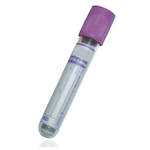Suitable Specimen Types
- EDTA Plasma
- Special Collection Procedures Apply
Specimen Transport
Send frozen to referral laboratory weekly
Sample Processing in Laboratory
Blood sample must reach the laboratory within 30 minutes
Sample Preparation
NOTE TIME WHEN SPECIMEN WAS TAKEN.
Centrifuge within 30 mins of collection.
Turnaround Time
5 daysSample Stability
Store plasma immediately at -20oC
Adrenocorticotrophic Hormone (ACTH)
General Information
Adrenocorticotropic hormone (ACTH) is produced in the pituitary gland to stimulate secretion of cortisol by the adrenal glands. Normally, ACTH increases when cortisol is low and falls when cortisol is high. The concentration of ACTH varies greatly at different times of the day, with the highest amount at about 8 am and the lowest about midnight, therefore the sample will normally be collected first thing in the morning.
Secretion of ACTH may be increased by stress.
Some drugs and conditions can cause ACTH levels to rise, including amphetamines, insulin, levodopa, and metoclopramide.
Drugs that cause ACTH to fall include dexamethasone and other drugs that act like cortisol (including prednisone, hydrocortisone, prednisolone, and methylprednisolone), and megestrol acetate.
Patient Preparation
Ensure patient is not taking corticosteroids, synacthen and avoid undue stress. Please state time of collection. Take blood into EDTA tubes and send to the lab immediately.
Notes
To diagnose adrenal and pituitary diseases such as Cushing's syndrome, Cushing's disease, Addison's disease, adrenal tumors, and pituitary tumors; usually done as a diagnostic test once an abnormal cortisol level is detected.
Reference Range
6 to 51 ng/L
Source of Reference Range
iDSSpecifications
- EQA Scheme?: Yes
-
EQA Status:
UKNEQAS scheme
